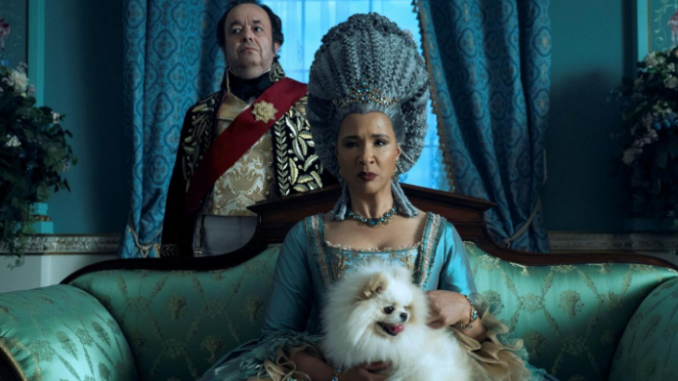
With her scornful gaze and giant wig, Queen Charlotte became a cherished character in the first two seasons of Bridgerton, Netflix’s hit series set in a racially diverse version of Regency England. Played by Golda Rosheuvel, she was a tough, gossipy, and beautiful matriarch.
Now, she’s the subject of her own six-episode prequel series on Netflix, Queen Charlotte: A Bridgerton Story, which tells the story of young Charlotte (India Amarteifio) as she rises to power. Viewers witness her whirlwind marriage to King George III, meet her spoiled children, and gain insight into her motives and loneliness. Of course, they also get plenty of glimpses into the royal bedroom.
“‘The love of Queen Charlotte and King George united the nation’ — that’s a line in Bridgerton, and to me, that line speaks to the world,” Shonda Rhimes, the show’s creator, said in a phone interview last week. “We’re telling the story of how their love united the world in a very small way.”
In keeping with the series’ overall approach to diverse casting, Bridgerton’s Charlotte is also presented as having both African and European ancestry — though in her case, that decision stems in part from speculation by some historians that Charlotte was actually biracial, a subject that’s been hotly debated.
But what do we know about Charlotte historically? What are the terms of the debate? And is that debate beyond the purpose of a story that Rhimes herself describes as fantasy? We spoke to Rhimes and a number of historians about the series, which has been the most-watched show on Netflix globally since its debut last week.
The basic facts of Charlotte’s life are well documented: Princess Sophie Charlotte was actually born in 1744 in Mecklenberg-Strelitz, now part of Germany. She married King George III at 17, six hours after arriving in London. The couple had their first child, George IV, in 1762, followed by 14 more children.
The first 25 years of their marriage appear to have been happy and joyful. They acted in plays together, gave concerts, and invited a young Mozart to perform for them in 1764. In 1788, King George III suffered a serious mental illness, and his aggressive, maniacal behavior became increasingly worse over time. In 1811, his son George IV took over as prince regent. George III was often isolated, and he and Charlotte lived increasingly apart. She died in 1818; George III died two years later.
The prequel is largely faithful to these details. In other details, the series takes unapologetic creative license—indeed, that license is at the core of its premise.
Since the beginning of the Bridgerton series, Rhimes and her team have been working with the idea, put forth by some historians, that Charlotte was a woman of mixed heritage, descended from a black branch of the Portuguese royal family. Many other historians disagree with that theory. But in developing the new series, Rhimes was less interested in the controversy than in keeping the world she had created: a fictional story with historical elements, in which a black Queen Charlotte, resplendent in jewels and corsets, ruled valiantly while caring for the king.
“I was allowed to really imagine telling the story of the character I cared about the most, and that was an easy starting point for me,” Rhimes said. “It wasn’t a history lesson. It was really the story of Queen Charlotte as we know her from Bridgerton.”
The idea that the historical Charlotte might have been biracial, through a black branch of the Portuguese royal line, was prominently raised by historian Mario de Valdes y Cocom in 1997 for PBS’s Frontline. But many historians have disputed that claim or argued that any potential African heritage would be so erased that it would be virtually impossible to trace.
Rhimes said she had no idea what Queen Charlotte’s true heritage was, although she found it “interesting,” she said, “that people had to say so emphatically that she was not black.” Arianne Chernock, a professor at Boston University specializing in British and European history, argued that questions about whether Charlotte was black or not ignore the point that being British, regardless of skin color, is not a given.
“We know that Queen Charlotte had Portuguese ancestry,” Chernock said. “She was a German princess, the daughter of a duke,” she continued, noting that “when Charlotte arrived in England in 1761, she did not speak English.”
“